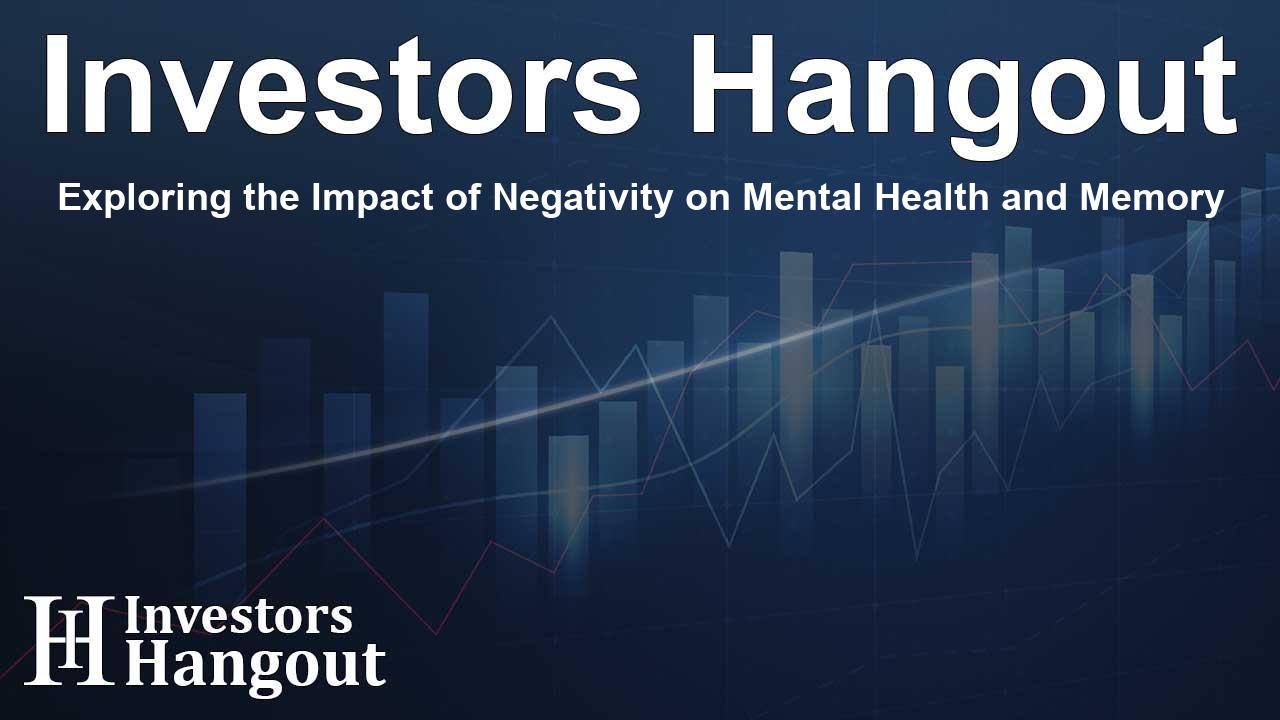Exploring the Impact of Negativity on Mental Health and Memory

Exploring the Connection Between Negativity and Mental Health
Recent research highlights a significant connection between chronic negativity and various mental health conditions. A new study sheds light on how negative thought patterns can lead to detrimental effects such as poor memory, depression, and even brain dysfunction.
Insights from Cutting-Edge Research
Conducted by Amen Clinics, this study utilized advanced SPECT imaging in analyzing brain scans of nearly 2,000 patients struggling with anxiety disorders. The outcomes were indeed eye-opening, revealing a strong association between high levels of negativity bias and diminished functionality in critical brain areas responsible for emotional regulation and cognitive processes.
The Impact of Negativity Bias on Brain Function
Patients exhibiting substantial negativity bias demonstrated decreased activity in pivotal areas of the brain, including the frontal and temporal lobes, the insula, and parietal regions. These brain areas play vital roles in focusing attention, making decisions, and maintaining emotional stability. Interestingly, researchers noted increased activity in certain cerebellar regions that relate to motor tension and emotional overreaction.
Consequences of a Pessimistic Outlook
Those with heightened negativity bias reported elevated levels of anxiety, severe emotional distress, and struggles with memory and stress regulation. This unfolding data is a critical reminder of the intricate connections between mindset and mental well-being.
A Call to Action from Researchers
Dr. Daniel Amen, one of the principal authors of the study, delivered a compelling message: "This research is a call for awareness. A small amount of anxiety can be beneficial, guiding us in vital decisions. However, chronic negativity is hazardous for our mental health. Evidence suggests that pervasive pessimism can lead to emotional suffering and unfortunately, in severe cases, suicidal thoughts."
Harnessing Positivity for Mental Well-being
The study emphasizes the necessity of addressing negativity bias through therapeutic practices. Researchers advocate for initiatives aimed at fostering positivity, which could drastically enhance brain health and cognitive function.
Daily Practices for Cultivating Positivity
To promote a healthier mindset, researchers suggest integrating positivity bias training into daily routines. A few simple practices include:
- Beginning the day with the mantra: "Today is going to be a great day."
- Consciously seeking out small moments of joy throughout the day.
- Ending each evening by reflecting on the question: "What went well today?"
What This Means for You
Understanding the influence of negativity on mental health can serve as an essential guideline for those looking to improve their lives. By being proactive in managing negative thought cycles, individuals may enhance their cognitive functioning and overall emotional health.
Frequently Asked Questions
What is negativity bias?
Negativity bias is the tendency to focus on negative experiences or thoughts more than positive ones, which can affect emotional and cognitive health.
How can negativity impact memory?
Research indicates that chronic negativity can lead to brain dysfunction, resulting in poor memory and cognitive challenges.
What practices can help overcome negativity?
Engaging in positivity training practices, such as daily affirmations and gratitude reflections, can help shift focus from negative to positive experiences.
Who conducted the study on negativity and mental health?
The research was conducted by Amen Clinics, focusing on patients with anxiety disorders and their cognitive and emotional health.
What areas of the brain are affected by negativity bias?
Chronic negativity can decrease activity in the frontal and temporal lobes, insula, and parietal regions, which are crucial for cognitive control and emotional regulation.
About The Author
Contact Henry Turner privately here. Or send an email with ATTN: Henry Turner as the subject to contact@investorshangout.com.
About Investors Hangout
Investors Hangout is a leading online stock forum for financial discussion and learning, offering a wide range of free tools and resources. It draws in traders of all levels, who exchange market knowledge, investigate trading tactics, and keep an eye on industry developments in real time. Featuring financial articles, stock message boards, quotes, charts, company profiles, and live news updates. Through cooperative learning and a wealth of informational resources, it helps users from novices creating their first portfolios to experts honing their techniques. Join Investors Hangout today: https://investorshangout.com/
The content of this article is based on factual, publicly available information and does not represent legal, financial, or investment advice. Investors Hangout does not offer financial advice, and the author is not a licensed financial advisor. Consult a qualified advisor before making any financial or investment decisions based on this article. This article should not be considered advice to purchase, sell, or hold any securities or other investments. If any of the material provided here is inaccurate, please contact us for corrections.
